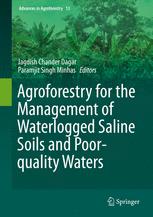

Most ebook files are in PDF format, so you can easily read them using various software such as Foxit Reader or directly on the Google Chrome browser.
Some ebook files are released by publishers in other formats such as .awz, .mobi, .epub, .fb2, etc. You may need to install specific software to read these formats on mobile/PC, such as Calibre.
Please read the tutorial at this link: https://ebookbell.com/faq
We offer FREE conversion to the popular formats you request; however, this may take some time. Therefore, right after payment, please email us, and we will try to provide the service as quickly as possible.
For some exceptional file formats or broken links (if any), please refrain from opening any disputes. Instead, email us first, and we will try to assist within a maximum of 6 hours.
EbookBell Team

4.4
32 reviewsLand degradation caused by salinity and waterlogging is a global problem afflicting about one billion hectares and endangering the food security of at least 75 countries. Since the social, economic and environmental costs of on and/off-farm reclamation techniques are high, agroforestry is now emerging as a potential tool, not only for arresting salinity and waterlogging, but also for other environmental services like mitigating climate change, sequestering carbon and restoring biodiversity. This publication addresses the vital issues, principles and practices related to rehabilitation using agroforestry and includes many site-specific case studies from a number of the world’s typical catchments. Written by leading researchers, the book is a must, not only for scientists whose research interests lie in soil salinity, waterlogging and poor-quality waters, but also policy makers, environmentalists, students, and educationists alike. More importantly, it contributes to reversing the salinity trends and ensuring the livelihoods of resource-poor farming families living in these harsh agro-ecosystems.